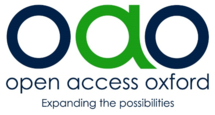Open access publishing FAQs - test
Open access publishing means research is made available for anyone to read for free.
The benefits of publishing your research open access include:
- Contributing to advancing knowledge and understanding faster, as other researchers can build on your work.
- More visibility for your work, which helps to build or enhance your research profile more quickly.
- Practitioners can access and use the results of your research – regardless of where they are or of their affiliation to a wealthy academic institution.
- Demonstrating good open access practices helps us secure more funding from the UK government and funders who have their own open access policies.
In some cases, you must publish your research open access to complete your degree at Oxford University or because it is required by your funder (if your degree or research is funded).
The author’s accepted version (AAV) or author’s accepted manuscript (AAM) is the final text of a research article after it has undergone peer review, considered accepted by the journal which will publish it.
The accepted manuscript has not yet been copyedited or typeset by the journal. This author’s version without the publisher’s formatting can be made open access by depositing it in ORA and any other public repository.
The final version after formatting by the publisher is usually called the “version of record” (VOR) or “published version”. Its format is definitive, it has a digital object identifier (DOI) and it is included in a volume of the journal’s archive.
The corresponding author of a journal article has some important responsibilities that co-authors do not. The corresponding author is responsible for:
- communicating with the journal throughout the publication process
- representing the University as a researcher, and as such can apply for financial support to cover open access fees (from read and publish agreements, block grants, or directly from funders, as well as any waivers or discounts);
- ensuring information about any financial support received for the study is correct and up to date for all authors;
- receiving any reader correspondence about the article after it is published (the corresponding author’s e-mail address is always published in the article).
Being the corresponding author is an administrative role. It does not necessarily indicate seniority or the importance of the individual’s contribution to the study. Although the corresponding author is typically the first or last author, any author can be the corresponding author, regardless of the position they occupy in the authors’ list.
It is advised or required by journals, and required by funders, that the corresponding author submits the paper for publication using an official institutional e-mail address. Using generic email addresses (such as Gmail or Hotmail) makes it impossible for funders to verify the author's affiliation with an institution.
Predatory publishers publish research without regard for quality or scholarly standards. They exploit the open access publishing model by charging authors a fee without providing proper peer review, editorial oversight or transparency.
Key characteristics of predatory publishers:
- Lack of proper peer review: predatory journals do not describe their peer review systems and often do not conduct peer review at all.
- Lack of transparency: predatory journals often have fake editorial boards and non-existent addresses. They may charge hidden fees or undisclosed Article Processing Charges (APCs).
- Poor author services: predatory publishers have low-quality editorial services and websites, and do not guarantee that research outputs will be available permanently.
- Deceptive indexing or metrics: predatory journals are usually not indexed in popular databases, limiting the visibility and impact of research.
- Spam invitations: predatory journals typically invite authors to submit manuscripts, often by sending out large numbers of emails. Reputable journals do not need to do this.
If you’re unsure whether a journal or publisher is legitimate, contact the Open Scholarship team.
The REF (Research Excellence Framework) is a national assessment of research in UK higher education institutions. It informs how public funding for research is allocated. REF expert panels look at indicators of research environment and impact, including publications, to make their assessment.
The previous REF was in 2021, and the next REF will take place in 2029. Journal articles and conference proceedings must be made open access to be eligible. This doesn’t apply to any other output type. Find out more about the REF.
The University of Oxford will cover the full open access fee for all Oxford-affiliated corresponding authors who are funded by one or more of our block grant funders.
If the corresponding author is from another institution and can cover the open access charges (via block grant or other funds), we would expect them to pay the entire fee. If the other institution cannot pay the APC in full, the Oxford-affiliated author should apply to the correct APC block grant held by the University of Oxford, and we will pay the entire fee. This ensures that the Oxford-funded author is compliant with their funder, even if they are not the corresponding author.
Information on locating open access works, as well as paid-for research output, is on our subject guides.
Contact us
If you have additional questions about publishing open access, please contact: openaccess@bodleian.ox.ac.uk




